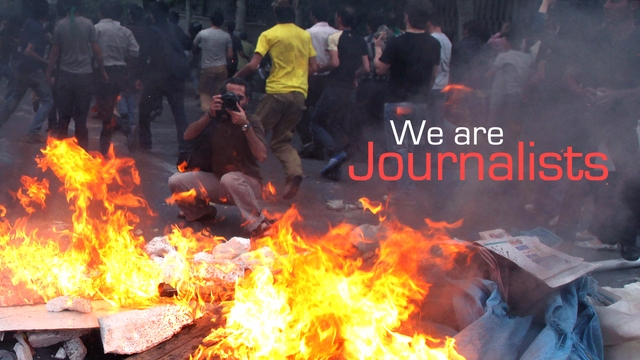How far would you go for freedom of expression? Would you risk losing your job? Your family? Your life? Suffocated by censorship and under constant threat of reprisal, there is always the chance that the next sentence they write could be the start of a confession in a regime prison. Filmed from the inside over the last decade, this is a window onto the corruption and brutality of the Ahmadinejad years, and their enduring legacy of silence.
"They forced my head down a toilet bowl while raping me with an unopened cola bottle", Sam Sarabi confides to the camera. He spent nearly 500 days in a Tehran prison, during which time he was subjected to lengthy periods of solitary confinement and the most obscene forms of improvised torture. His fate awaits any journalist who dares to publish even the slightest incivility in a state that has its hands wrapped firmly around the neck of the print and broadcast media.
"The government has forbidden any criticism because they say that we demoralise the people", explains another member of the press.
Faced with an embargo on unflattering reporting and an administration that routinely commits atrocities to silence people in the streets, writers, photographers, and bloggers are forced to choose between integrity and survival.
"I think it's better if the journalists keep their political opinions separated from their job if money is important to them", says an adviser at the Association of Iranian Journalists. But amid police brutality, electoral interference, and soaring numbers of shut-down newspapers, many have attempted to wriggle free of the occupational straitjacket.
"I couldn't close my eyes and be silent", says Naieme Doustdar, recalling the outcome of the 2009 presidential election, regarded by most to have been rigged.
"If journalists didn't live up to their responsibilities, the world wouldn't know the truth!" Interweaving his own story with the recollections of his colleagues and remarkable clandestine footage, Ahmad Jalali Farahani exposes the dark reality of resistance to the Party in a country still a long way from freedom.
LEARN MORE.
WATCH MORE.
JOIN THE DISCUSSION.

Official Selection - Copenhagen International Documentary Film Festival, 2014
 How far would you go for freedom of expression? Would you risk losing your job? Your family? Your life? Suffocated by censorship and under constant threat of reprisal, there is always the chance that the next sentence they write could be the start of a confession in a regime prison. Filmed from the inside over the last decade, this is a window onto the corruption and brutality of the Ahmadinejad years, and their enduring legacy of silence.
How far would you go for freedom of expression? Would you risk losing your job? Your family? Your life? Suffocated by censorship and under constant threat of reprisal, there is always the chance that the next sentence they write could be the start of a confession in a regime prison. Filmed from the inside over the last decade, this is a window onto the corruption and brutality of the Ahmadinejad years, and their enduring legacy of silence.
 Official Selection - Copenhagen International Documentary Film Festival, 2014
Official Selection - Copenhagen International Documentary Film Festival, 2014




